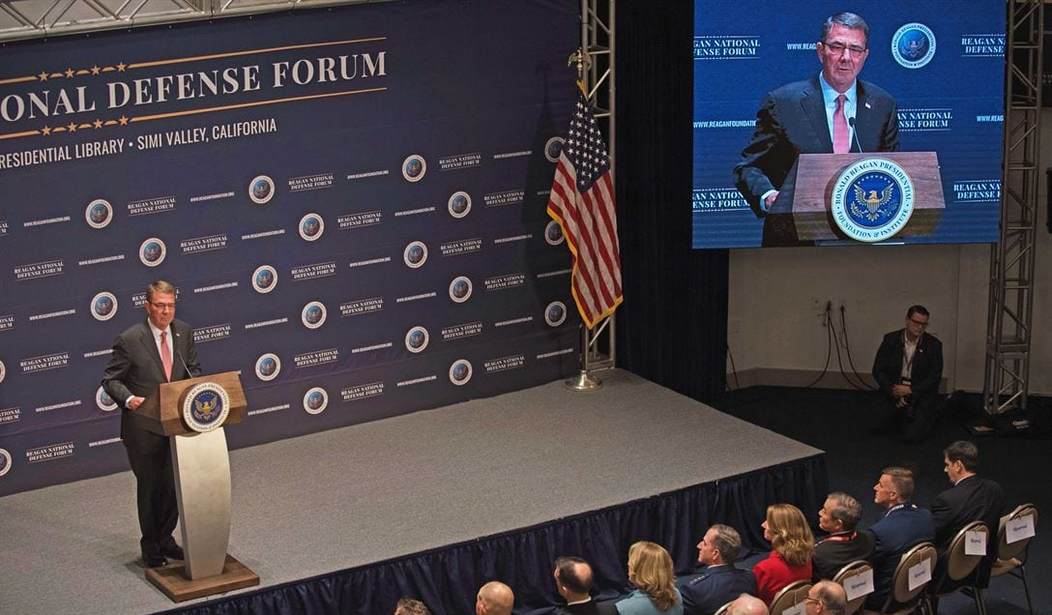Defense Secretary Ashton Carter said at the Reagan National Defense Forum on Saturday that the United States “must widen the spectrum of our current and future capabilities to account for this great change” in this time of “strategic transition” — “the great change, economic, political, military, social and technological, underway.”
Carter singled out five “distinct and evolving” challenges faced by the Defense Department.
“We’re countering the prospect of Russian aggression and coercion, especially in Europe – something we haven’t had to worry about for the last 25 years, but now we do. We’re also managing historic change in the Asia-Pacific – the single most consequential region for America’s future. We’re strengthening our deterrent and defense forces in the face of North Korea’s continued nuclear and missile provocations. We’re checking Iranian aggression and malign influence in the Gulf, and helping defend our friends and allies in the Middle East. We’re countering terrorism and accelerating the certain and lasting defeat of ISIL,” he said at the Simi Valley, Calif., presidential library.
In “an uncertain future,” Carter emphasized, the military must be “ready for challenges we may not anticipate today,” being “able to deter the most advanced adversaries while continuing to fight terrorist groups.”
“To be clear, the U.S. military will be ready to fight very differently than we have in Iraq and Afghanistan, or in the rest of the world’s recent memory. We will, as we must, be prepared for a high-end enemy – what we call full-spectrum. In our budget, our plans, our training, our capabilities, and our actions, we must demonstrate to potential foes that if they start a war, we will win it,” he added. “Because a force meant to deter conflict can only succeed in deterrence if it can show that it will dominate a conflict.”
The U.S. has reached “a critical milestone” in the fight against ISIS with the coalition-backed operations to liberate Mosul and Raqqa “to ensure the destruction of ISIL’s parent tumor in Iraq and Syria – the primary objective of our military campaign – and put ISIL on an irreversible path to a lasting defeat.”
Carter said Obama “has approved every single recommendation that the chairman [of the Joint Chiefs of Staff] and I have taken to him for additional forces and capabilities as we saw – as we constantly have – additional opportunities to accelerate the campaign.”
Ultimately the most important anti-ISIS mission, he said, “is to work with our intelligence, homeland security, and law enforcement partners to help protect our homelands and our people from attack.”
On Russia, the Defense secretary said the “aggression and provocation” from the Kremlin “appear to be driven by misguided ambitions and misplaced resentment.”
“Russia wants to be considered, understandably so, as the important power it is. And indeed, its history is rich – one of which its people can and should be proud. But in recent years, some in the Kremlin have reinterpreted that history to fuel grandiose visions and provocative, destabilizing actions abroad,” Carter said.
“We see that in Russia’s aggression in Ukraine and Georgia, its counter-productive role in the ongoing tragedy in Syria, its attacks in cyberspace, its violation of arms-control treaties and other international agreements, and, perhaps above all, its nuclear saber-rattling. These actions are not what the world expects of a responsible state in the twenty-first century; rather, each threatens to undermine global security and erode the principled international order that has been so good not only to the United States, but also to Russia and the world.”
Carter said the U.S. doesn’t “seek an enemy in Russia,” but underscored that “we haven’t had to prioritize deterrence on the Transatlantic Community’s eastern flank for over 20 years — and unfortunately, now we do.”
“That’s why the United States is strengthening our deterrence posture in Europe, to adjust our military posture and presence in Europe to be more agile and quicker in responding to the threats that Russia might pose. Our latest defense budget request includes significantly more funding for our European Reassurance Initiative – more than quadruple what we allocated the year before,” he continued. “That’s intended to allow us to – in addition to the two brigades we already have stationed in Europe – rotate an Armored Brigade Combat Team into Europe on a persistent basis, and to pre-position a brigade-worth of equipment and warfighting gear to be used by American forces flown into Europe among other steps.”
While Carter emphasized U.S. alliances in Asia to confront the North Korean nuclear threat, he did not elaborate on initiatives to stop Iran’s aggression.
The Defense secretary spoke on the one-year anniversary of his decision to open all roles in the military to women.
“I directed that there be no quotas, and that is why the number of women in the previously-closed specialties may be modest. But they will be the best talent for the job,” Carter said. “And even for women who don’t choose these specialties, the fact that they are open means any woman in uniform will be measured by her contribution to the force no matter what career field she chooses.”









Join the conversation as a VIP Member